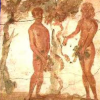I so enjoyed Scott Robinson’s article “Buddhists Have it Wrong about Original Sin” that I am inspired to post the following words in response.
As a trumpet player who knows his way around noisy valves and spit valves, I really enjoyed Scott’s musical metaphor. So, I’ll include one of my own. What you are about to read is an excerpt from my soon to be released book, Kissing Fish: christianity for people who don’t like christianity, Roger Wolsey, Xlibris Press, 2011. I’ll be keenly interested in any feedback that folks may offer. Who knows? I may end up quoting you in the book!
sinfully yours, Rev. Roger Wolsey
A Progressive view of Humanity & the need for Divine Grace:
With the advent of human beings from the long processes of evolution and natural selection, a species was created that: is aware that it exists; has high critical thinking and tool-making skills; is capable of humor and self-reflection; can work as co-creators with God; can choose to worship God and be awed by, respect, and care for God’s creation; and who can choose paths of great self-harm and destruction.
We are potentially moral beings. We can decide to act in accordance with the needs of one another, our planet, and our God. When we opt to not act in accord with God’s will, we sin. Sin means “missing the mark.” It’s like when an archer shoots an arrow and it fails to hit the target. The further away the shot lands, the greater the degree of sin. Though neutral or good in nature, we’re busted and broken. We’re cracked pots. We’re imperfect vessels. We’re beautiful messes and we’re paradoxes. We’re selfish and selfless. We’re a lovably, consternating amalgam of sinner and saint.
Due to our very real free will, we humans have a very real propensity to screw up, make mistakes, and sin. Sinning is a bit like getting frostbite, once you’ve experienced frostbite on the tip of your nose or on the tips of your toes or fingers, those areas become more likely to become frostbit again in the future. And with each new instance of frostbite increases the likelihood of new experiences of frostbite. It’s also a bit like trying to eat just one Pringles potato chip or one spoonful of Ben & Jerry’s ice cream, once you’ve had a taste, it’s awfully hard to not eat more. Sinning is also very much like an addiction. The more you do something, the more it becomes a habit and a pattern deepened “deer trail” in the brain becomes established. In time, those deer trailed neuro-pathways become widened to become neuro-superhighways which become our default way of being. Progressive Christians view Christianity, in part, as a way to break apart those dysfunctional superhighways that lead us off self-sabotaging cliffs. It provides a way of repenting and reorienting to establish alternative neuro-pathways, ones that with enough nurturing and practice can become such a dramatically different “new normal” way of being that we can say that we have been converted, saved and are “born again.”
In Jesus’ day, sin had become reduced to legalistic notions about being ritually impure and “dirty,” and unworthy of participating in Temple practices. Jesus helped to subvert that notion. Instead of treating sin through the lens of some sort of retributive law books, “if you commit x transgression, you deserve y punishment,” etc., Jesus embraced restorative justice and saw that when sin is committed, it harms both the sinner as well as persons his/her actions may have harmed. Jesus emphasized restoration and reconciliation of relationships – not the doling out of appropriate punishments that only further alienate people from one another. There is a Christ-centered call for us to curb much of our evolutionary processes and oppressive natural selections. Examples of this include a call to not boot out of our societies or kill the elderly, infirm, or infants who are born with handicapping conditions; a call to not resort to violence or getting even when dealing with conflict; and a call for straight men to not sow their seed with anyone with a vagina but instead to choose to monogamously commit to one woman. The early Christians were known by the Romans for their deep love for each other and how they tended to the dying, sick and the lame; how they took pains to provide burials for paupers and those written off as scum and paupers; and how they sought to forgive each other and restore relationships. Tertullian, an ancient Roman scholar, is famously reported to have said, “Look at that those Christians! See how they love each other!”
Clearly, a substantial risk is involved on God’s part as there is a great potential for suffering, both on the part of humans and God, due to this free human choice. There are varying degrees of this potential choosing. People are not easily able to choose and act in complete accordance with God’s preferences and aims. We are only able to do so in varying degrees. On our own, none of us are able to fully satisfy God’s callings. Sinfulness and falling short of the mark is part of our human nature. Like the rest of creation, we humans have inherent value but we are neither the peak, nor are we necessarily “the purpose,” of God’s creative energies. It is “from dust” that we came and it will be to dust that we shall return (Genesis 3:19). Progressive Christians tend to contend that humans never experienced any “original state” that entailed a carefree, harmonious, and fully God-connected Eden. The idea of a Golden Age in our past is a beautiful, but nearly universal, human myth. Humans haven’t “fallen” from some idealized status or state of being, and there was no literal “original sin” – at least not in the sense that that term is often used. Progressive Christianity tends to suggest that from the very beginning, we have had both propensities to seek union with God as well as tendencies to attempt to do things our own way.
Genesis 1:26-27 proclaims that humans are created in “the image of God.” Numerous doctrines have been generated in response to this “Imageo Dei.” We don’t need to understand this to mean any sort of “original spiritual possession” that we “lost in the fall.” Nor do we have to accept the notion that we ever had any Godly supernatural endowment (Similitudo Dei) of original righteousness – at least not in the sense that “Adam and Eve” were incapable of acting out of sync with God’s will (sinning) as clearly according to that story, they did sin. Like God, humans have creative free will and agency, and it is this quality that is most appropriate to lift up when we attempt to understand ourselves as similar to God and created in His image. To the extent to which we are drawn to the idealistic visions of what kind of people “we once were before our falling,” we can agree with Karl Barth, who also rejected the idea that the first humans “had a natural basis” for knowing God more fully, that this view of the image of God should be held as an eschatological goal; i.e., what we are striving to attain and achieve.
We’ve earlier outlined how God attempts to persuasively lure us toward following Her discerned best possible choices in every given instance – the “initial aims.” Humans are endowed with creative souls that receive these preferred “aims” from God. The soul is where we struggle with how to perceive, interpret and respond to God’s nudges and callings. We can leave open the question as to whether the soul is merely an “appropriate metaphor,” or if it has a particular ontological, physical, or supra-natural existence. To be sure, we are not merely spirited souls, we are embodied[1]. Sinning doesn’t take place by disembodied souls, it occurs in the thoughts and bodies of embodied souls; i.e., by human beings.
I will discuss this further in the chapter on Evil, 5, but for now l offer this working definition of sin: Sin is disconnection from God and from whom we are meant to be. It is falling short of the mark of God’s initial aims for our lives, including in any given moment. Sin is the extent to which we do not follow God’s initial aims or accept Her grace – choosing instead to go our own way out of communion with God. Sin means doing what we shouldn’t do and failing to do what we should. It means living falsely and contrary to reality. We sin when we are not seeing things the way they truly are thus we do not understand the full consequences of our actions in our “unreality.” If we did, we would not do them, because we would realize that we are only causing suffering to ourselves and others (including the fact that any time we cause suffering to others, we cause ourselves to suffer). Moroever, it seems that some of us, and therefore all of us, have it within us to knowingly do harm – even when we do realize that we are harming others or ourselves. Though some would argue that if someone does something that harms others or themselves, they don’t truly perceive things rightly and really wouldn’t do them if they really, and truly knew the consequences of their actions.
Either way, sin is a way of life that is readily ingrained through the negative role-modeling of our families, leaders, and peers and the inertia of the past. With repetition, it becomes a destructive habit of the heart – both on the personal level and on the societal one. It is equally sinful for us to fail to live up to our potential grandness (being overly humble, meek and subservient to corrupt persons or powers) as it is for us to act beyond our proper place (being overly selfish and prideful). This phenomenon has historically been a gendered one. Because of sexist oppression, many women have been socialized to be overly timid, quiet, and submissive, while men have been molded to be too self-assured, independent, and arrogant – there are of course, many exceptions on both sides.
This isn’t to say that God is the only one who makes the decisions and that our only options are to follow or not to follow, as this would not allow for full human agency – merely blind obedience. We have true creativity, we can initiate many wondrous things of our own and we can adapt or improvise upon God’s actions and callings. Sometimes, our collaborations with God result in much beauty and goodness. However at times, we really botch it – sometimes big time. Human history is rife with examples of both. However, progressive Christianity suggests that we’d do well to reject doctrines that focus exclusively upon the shortcomings of humanity as “totally depraved” or “worm-like.” We are able to connect to God, and yet none of us do so readily or fully. We aren’t doomed wholly to sin, transformation is possible! However, we need help, and this is most effectively done through accepting the freely given grace in the kerygma of the reconciling atonement of the life, truth, way, death, and resurrection of Jesus Christ. The acceptance of this atoning kerygma is the Christian way, and we are called to share with others (Matthew 28:16-20).
All humans have experienced brokenness and “dis-ease” of some sort in themselves and in the world[2]. As Christians, we realize that there is more to life than alienation and suffering. We also know about and experience God’s grace, forgiveness, acceptance, and love. God offers us the power to avoid, minimize, and heal future brokenness in ourselves and in others. Being humans, faithful believing Christians will continue to stumble and our ways may seem to be ridiculous and hypocritical folly to others. We care about all people and seek to demonstrate the value of our Way. We lovingly remind the world that “the Church isn’t a museum of saints, it’s a hospital for sinners[3],” and that Christians aren’t perfect, we’re simply people who realize that we’re forgiven and have hope sufficient to arise every morning (every moment in fact) knowing that, in Christ, we have a fresh start, a second chance and a new beginning. As the Apostle Paul put it,
“So from now on we regard no one from a worldly point of view. Though we once regarded Christ in this way, we do so no longer. Therefore, if anyone is in Christ, he is a new creation; the old has gone, the new has come! All this is from God, who reconciled us to himself through Christ and gave us the ministry of reconciliation: that God was reconciling the world to himself in Christ, not counting men’s sins against them. (2 Corinthians 5:16-19)
Ultimately, progressive Christianity shifts the focus from “avoiding sin” to “focusing on love.” Humans tend to manifest what we place our intentions and energies upon. If we focus on avoiding sin, we may end up caught up in the mires of it. Put another way, a Christian “campaign to stamp out sin” will always bring about less light, love and wholeness in the world than a “campaign to live in love.” So, instead of focusing solely on not sinning, progressive Christians seek to emphasize following Jesus’ over-arching teachings that God is love, God loves us, and we are called to love ourselves and our neighbors in response. It’s more positive, which is important for anyone who is recovering from the scars of a judgmental church upbringing. Granted, we’ll never be able to love perfectly, but there area practices and disciplines that can help us to love the best that we can. (see chapter 10).
I close this chapter by offering a unique sort of “beatnik sermon” that I wrote back in 1994 during my years in seminary. I delivered it as part of a chapel worship service at the Iliff School of Theology. I think it captures well the understanding of sin that we’ve been exploring. You might want to snap your fingers and make soft, high-hat cymbal sounds as you read this: “t-ttsss tt, t-ttsss tt, t-ttsss tt, t-ttsss tt, t-ttsss tt …”
Groovin’ With God by roger wolsey
Our Creator God does indeed create. Mercy and how!
But She is not the only one who makes the decisions about what will be created.
If that were the case, blind obedience... would be our only mission
we would merely be puppets who could only do things when God pulls our strings.
Dig this. As children of God who've been called to groove,
let's groove on the metaphor of "Jazz Music."
In jazz there is an imperative for listening to, and respecting the composer and director.
However, for truly beautiful and creative music to flow,
there must be room for the musicians to play off the score.
We need, to improvise.
Now God is the composer and lead musician of all creation.
He sets the beat and the main melody lines, and we humans, well we're asked to apply our gifts and graces and to playfully experiment and create variations on the themes.
Check it out! When we open-up and listen...
we can hear some cool and kickin' riff floating in from above...
"Dom diba dooba, dom diba dooba.."
We can groove on that wave for a while....
Dom diba dooba, dom diba dooba!
- then, one of us gets an idea of her own,
doobie doobie dooba, doobie doobie dooba...
she tries it out & adds a little bit of this... zoobie dee dom, zoobie dee dom, ... and brings in some of that.. zip zip zoi, zip zip zoi...
and before too long, something new has been created
something that can only come from the dynamic synergy
of God
and God's People,
jamming together!
However, we need to carefully listen to, and work with, God and each other otherwise.... all we have... is noise.
The fool notion that "there are no wrong notes in jazz" is musically - false.
We can monopolize the act and not allow God or the others their turns to play..
..we can play out of tune or in the wrong chords....
we might play too weakly when it's our turn to solo..
or try to "hide-out" by meekly playing behind the others...
or we might play in an inappropriate style, straight - when it should be swung,
Dixie, when its supposed to be Cool... Be-bop, when it oughta be Smooth,..
and so on, and so on, etcetera, etcetera... Man!
None-the-less, God desires this creativity on our parts - you dig?
And She risks the sour notes. She always attempts to make beautiful whatever we come up with.
Humph... Sometimes, well, sometimes He has to work harder than others! But no matter what, God is inviting us to make beautiful music together.
It's up to us.
Are we willing to open up our ears?,
to release the energies of our minds?,
to let loose the passion in our
hearts, souls and bodies?!
Now, Listen Up you Cats!
Let's let God know that we've
tuned our horns, freed our souls,
and that we're ready
to groove with the Lord! Amen!?
[1] For more on this see The Body of God: an Ecological Theology by Sallie McFague.
[2] Not necessarily actual disease, but dis-ease of various kinds for sure.
[3] Attributed to both Abigail Van Buren and Morton Kelsey















Read 12 comments and reply